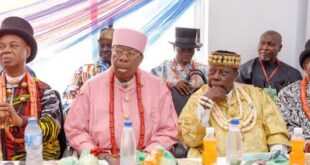Communities in Tai Local Government Area of Rivers State have expressed concern over what would be their means of survival throughout the period of the cleanup exercise when it eventually kicks off.
They noted that when the cleanup starts, they may no longer have access to their farms and rivers, for farming, fishing and other activities upon which the community members depend for food and survival.
The concern was raised during a sensitization summit on environmental, social and human rights impacts of oil pollution organised in Saakpenwa, headquarters of Tai LGA by an NGO known as Centre for Environment, Human Rights and Development (CEHRD) with support from Catholic Organisation for Relief and Development Aid (CORDAID).
Participants at the summit who were drawn from different communities in Tai LGA lamented that if steps are not taken to provide alternative means of livelihood, the cleanup and remediation expected to last for about 30 years, would lead to serious suffering for the people while the exercise lasts.
They called on the government to make available for the communities, potable water as well as resources to enable them embark on agro-based business and to embark on fishing outside Ogoni waters. They also urged the government to empower the communities, including the youths, with skills necessary to enable them diversify to other sources of livelihoods outside fishing and farming.
Rukevwe Siakpere-Ekine, CEHRD’s Project Officer who facilitated the summit commended the communities for articulating their concerns and for their fruitful contributions during the meeting. She advised that while the demands by the communities were legitimate, they should remain peaceful and encourage the government to successfully carry out the cleanup exercise aimed at restoration of the environment. She noted that while the concerns raised may not have been in the cleanup plan, the communities and NGOs should begin to use them as part of their advocacy and engagement messages in their non-violent clamour for environmental justice.
She, however, urged the government to incorporate the concerns of the communities into the cleanup program, saying that the communities need to be carried along to ensure the success of the program.
The CEHRD Project officer explained that the summit was aimed at sensitizing the communities on roles they are expected to play towards making the restoration of Ogoni environment a success. She said the communities are expected to shun violence and maintain peace to allow the implementation of the cleanup program. “The communities are also expected to make themselves available for capacity building programmes towards participation in the environmental restoration process as well as to be vigilant to avoid pipeline sabotage which would further lead to pollution”, she said, adding that the ESHRI project being implemented by CEHRD is aimed at redefining community expectations from the cleanup process, strengthening community monitoring capacity of impacts of the process on ESHR and strengthen communities capacity to advocate for social justice on oil spill impacts.
 PH Mundial – Port Harcourt Online Newspaper News Across The Region
PH Mundial – Port Harcourt Online Newspaper News Across The Region




